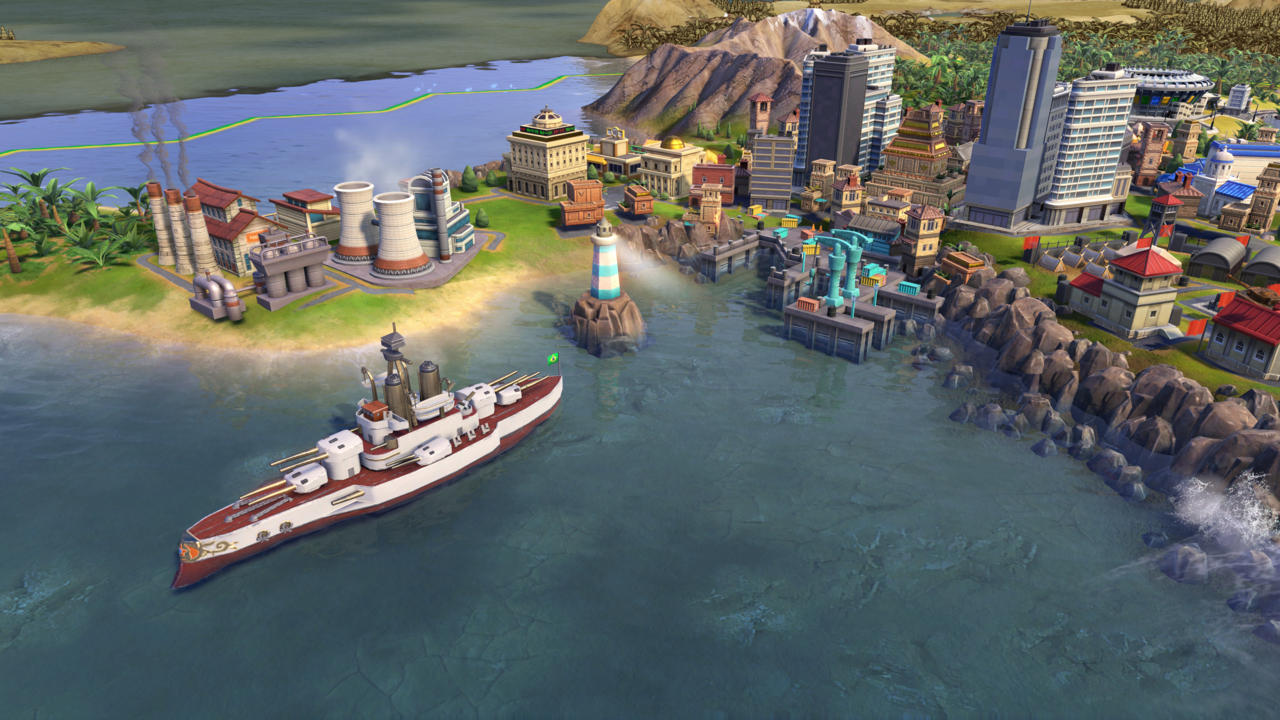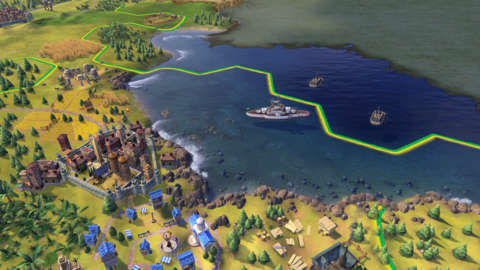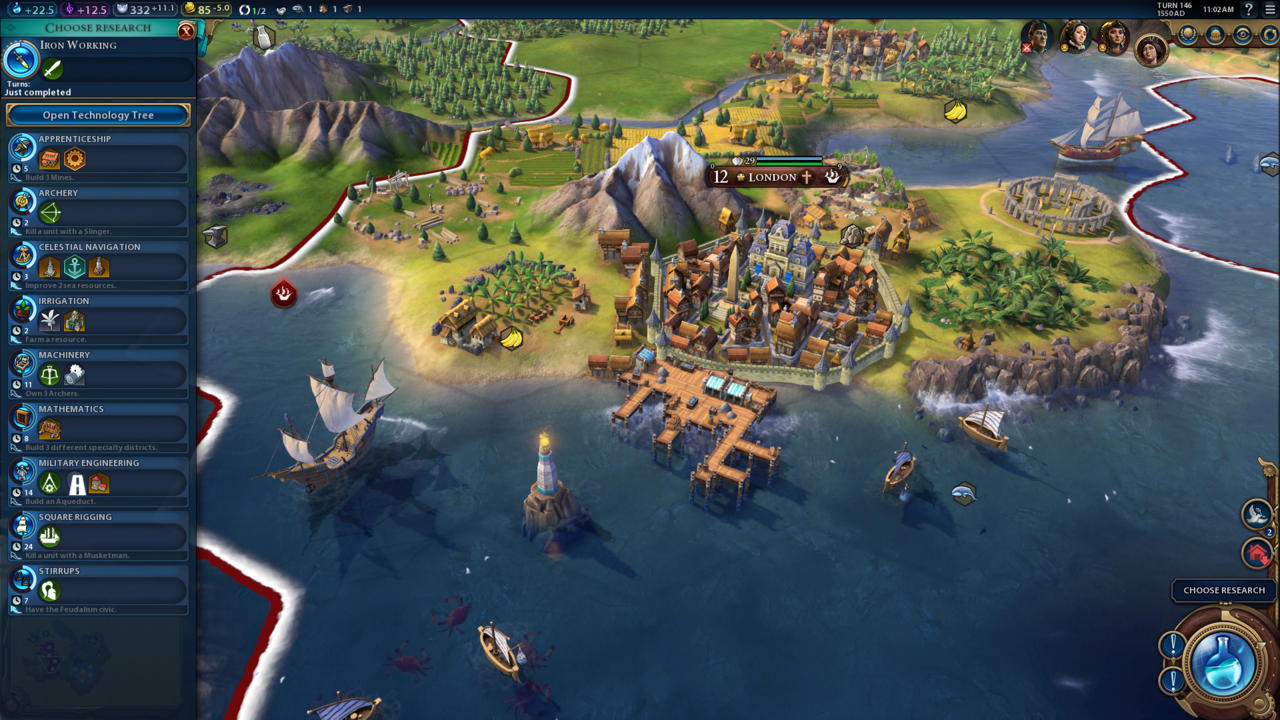The barbarians emerged from the fog to the North, riding toward Paris, three lines deep on foot and horseback. They were healthy and determined, moving downhill at a measured pace. I aligned my spearmen around the capital city, but these soldiers were weak, drained from months of fighting and diminished food supplies. They were hanging by a thread, with no end in sight.
I could have avoided this if I had just ignored Zanzibar.
At any given period in my French empire's timespan, from its meager beginnings as a primitive settlement, to a flourishing nation in 1780 AD, I had to consider my people's scientific aspirations, cultural impact, military strategy, diplomatic stance, public reputation, geographic location, health standards, and economic stature in the global marketplace. In Civilization VI, there's more weight to each turn than those of its predecessors, and there's less waiting as empires unfurl through history.
The first thing that struck me during my recent 150-turn demo was Civ VI's new art style--it's bolder, more vibrant than the entries that came before it. Soldiers take on a more cartoon-ish hue. Cities display more detail in their structures. The fog of war covers the land behind my scouts, crawling back over the plains in the form of stylized parchment, straight from an ancient library covered in dust. It's as if developer Firaxis molded the colorful palette of Civilization Revolution with the grounded reality of Civ V.

Spectacle soon took a back seat when I glimpsed the first barbarian unit in the mountains outside of Paris. "Where there are barbarians, there's usually a nearby camp," I thought. As the stoic leader Catherine de Medici, I began training a soldier unit in my capital city, and sent my scout North, up the mountain range, to find the hostile tribe's home. In only two more turns, I found it. Two turns later, I destroyed it and pillaged it for gold.
Thinking the barbarians disposed of, I turned my attention to internal matters: growing food, fostering culture, creating a defensive military force, and establishing a sustainable economy. For 100 years (five turns), my civilization flourished, and I was ready to establish a new city, to the Northeast, where the river ran out into the ocean. That small patch of land would become Bordeaux, a region famous for its wine in the real world, but known for its military might on this virtual Earth of mine.
Civ VI's new district system became evident as soon as I decided to make Bordeaux a military stronghold. By building an Encampment district to the Southeast of the city center, I not only created a second line of defense against attackers, but also a place to build barracks and train soldiers. In previous Civs, this would all be done on one tile, where my city first sprang up. Now, by "unstacking the cities," as Firaxis is saying, there's more nuance to metropolis creation. Bordeaux expanded, my population grew, and all in all, my people were happy.

This was thanks in large part to Civ Vi's active research system. It functions like a list of side quests tied to individual branches of the technology tree. Although I wanted to research the wheel, which would open up more modern machines down the road, my research rate at the time was only good enough to complete the project in eight turns. However, because I made three farms in the interim, I boosted progress on the wheel. It created an alternative to simply waiting. As time continued, I checked the tech tree often, discerning whether I could boost any other projects through tangential side quests.
But then the barbarians came. Not the foot soldiers from before, but cavalry this time, and many of them. They must have come from a different camp, I thought. They were riding toward Paris fast.
By unstacking cities, Civilization VI adds more nuance to metropolis creation.
As Catherine de Medici, an Italian noblewoman who became queen of France through familial ties in the late 16th century, I had a finger on the pulse of the diplomatic scene--the Flying Squadron, her unique ability, places women in the courts and forums of other empires, feeding her information as other leaders make crucial decisions. Based on the info from my contacts, Hojo Tokimune of Japan and Teddy Roosevelt of America were both creating numerous settler units, implying swift expansion across the Eastern part of our shared continent. Knowing this, and knowing how quickly real estate can disappear on crowded landmasses, I set about removing the barbarian obstacle.
The fight lasted for 80 years. As my people grew tired of strife, my food supplies plummeted, my trade routes dissolved, and international relations weakened. Qin Shi Huang and his Chinese Empire craved Wonders, and were envious of The Hanging Gardens of Babylon, draped as they were over the banks of the river outside of Paris. Roosevelt threatened me with American troops on the plains outside Bordeaux.

My fight with the Northern tribes had distracted me. Leaders in Civ VI have historical agendas, which dictate AI behavior based on actual real-world events--but they also have hidden agendas. These require more intuition and intelligence to discern. As it turns out during the recent playthrough, I had neither.
I hadn't paid attention to the intel my spies afforded me. Tokimune had been pursuing favorable relationships with Zanzibar, a nearby city state, and grew envious of my good standing with the entity. If I had just backed off a little bit, decreased trade relations with the city, maybe stayed neutral instead of maintaining the alliance, I could have avoided a two-front conflict. But Tokimune, with his hidden agenda geared toward city state relations, declared war before I could prepare. His troops were crawling across Paris in only two turns, weakened as it was from the previous fight.
Despite my failure, that playthrough taught me a lot. There's more to consider in Civ VI. There's more potential for conflict at every turn. The active-research side quests, nuanced diplomacy system, and unstacked cities all add major factors to the decision-making tempo of the long-running strategy franchise.
Being a leader might require more of me this time around.

